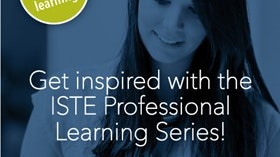Homepage
•
Learning Library
•
Blog
•
2015 ISTE Professional Learning Series
Expand breadcrumbs
Expand breadcrumbs
- Learning Library
- Blog
- 2015 ISTE Professional Learning Series
- Homepage
- •
- Learning Library
- •
- Blog
- •
- 2015 ISTE Professional Learning Series
2015 ISTE Professional Learning Series
By Heidi Ellis
February 5, 2015
